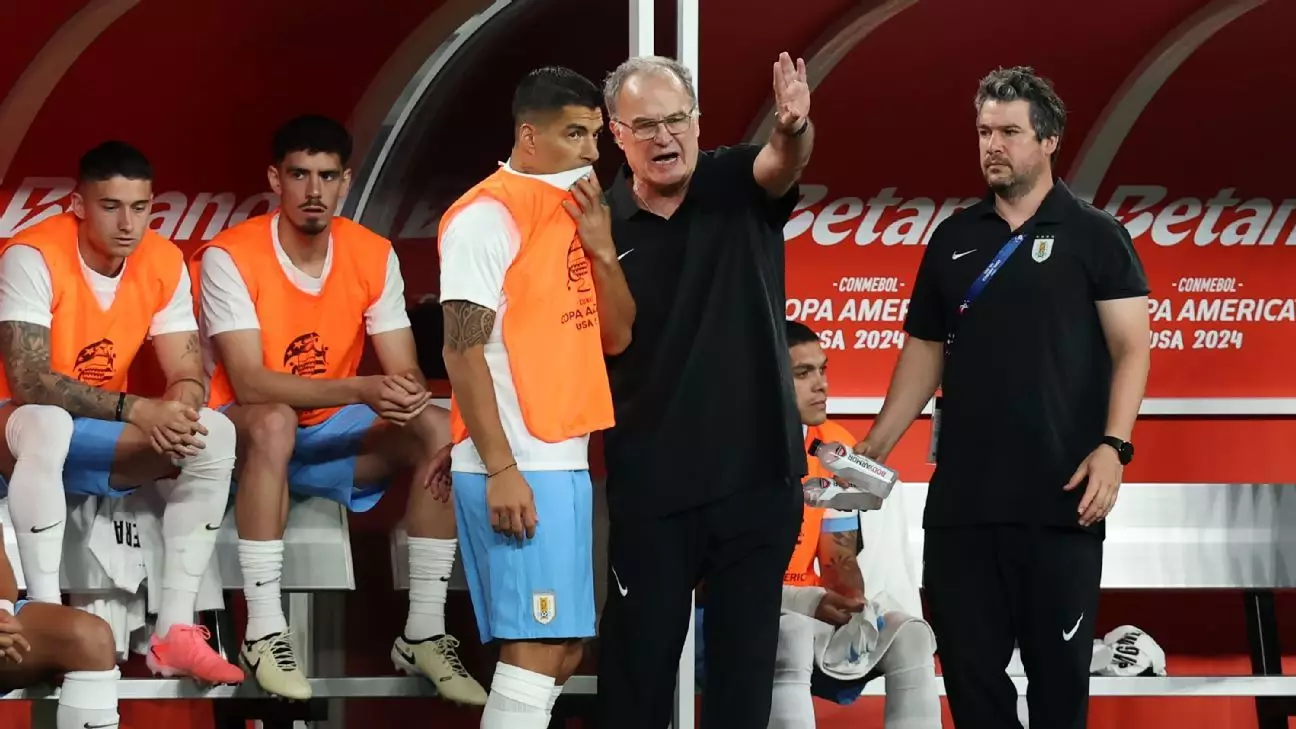In a candid interview, Luis Suárez has shed light on alleged troubling dynamics within the Uruguay national football team under the coaching of Marcelo Bielsa. Having joined the squad on May 15, 2023, Bielsa’s tenure quickly became a topic of contention, particularly highlighted during the 2024 Copa América. Suárez’s remarks highlight not only the drastic changes imposed by Bielsa but also raise broader questions about leadership styles, team cohesion, and the influence of external pressures on players’ mental well-being.
Suárez’s detailing of the restrictions at the Celeste Complex reflects a significant shift in team culture, emphasizing an environment that may be detrimental to camaraderie and overall morale. The explicit ban on staff interactions, such as greetings or sharing meals, illustrates an isolating atmosphere that arguably contradicts the very principles of team unity and collaboration in sports. The forward lamented this situation, indicating that it deeply affects the daily lives of players and staff alike.
Furthermore, Suárez described the communication gap between Bielsa and his players as detrimental to the team’s dynamics during the tournament. Within the high-stakes environment of international football, effective communication is paramount. The absence of a simple “good morning” from Bielsa became emblematic of deeper rifts that could hinder team performance. This situation evokes empathy towards Suárez and his teammates, who sought to foster a supportive environment amidst recognizable strains.
The players’ need to convene in hopes of improving communication underscores a troubling management style. Their collective request for a more amiable relationship with their coach indicates a clear desire for a cohesive team atmosphere—one that fosters both performance and emotional support. The fact that Bielsa’s response to these concerns was indifferent suggests a potentially corrosive leadership approach that, rather than empowering players, alienates them.
Despite the tumultuous backdrop, Uruguay managed to secure a respectable third-place finish at the 2024 Copa América, ultimately defeating Canada in a tense penalty shootout. However, Suárez’s insights reveal that operational challenges behind the scenes overshadowed this achievement. He expressed discontent that Bielsa would extol virtues of sociability and connection while simultaneously discouraging such behaviors among his players.
The narrative Suárez has portrayed is one of juxtaposition: the outward success of the team contrasted with the inward struggles of its members. Such discrepancies showcase the complexities faced by athletes, where public perception may starkly differ from private realities.
As Suárez concluded his illustrious international career, having become Uruguay’s all-time leading scorer, his reflections on the coaching circumstances carry significant weight. They urge a re-evaluation of leadership strategies within the sport, emphasizing the importance of balance between authority and approachability. While Bielsa may possess an impressive tactical acumen, Suárez’s articulation of team members’ collective discontent highlights a crucial aspect often overshadowed by performance metrics: the necessity for coaches to maintain healthy, communicative relationships with players.
In light of ongoing preparations for the 2026 World Cup, Suárez’s call for understanding from fans emphasizes the collective responsibility felt by the team. As Uruguay navigates its current position in the Conmebol rankings, his advice to not place blame on players if outcomes falter resonates deeply. It signifies a crucial message about the long-term impacts of managerial styles and the need for positive environments in facilitating success, both on and off the field.
Suárez’s revelations about the Uruguay national team provide a poignant reminder that soccer transcends mere athletic performance. It encompasses the mental health, cohesiveness, and motivations of those involved, stressing an imperative to cultivate environments rooted in respect, communication, and cooperation.

